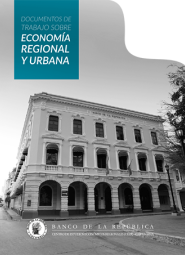Borradores de Economía - Minimum Wage and Macroeconomic Adjustment: Insights from a Small Open, Emerging, Economy with Formal and Informal Labor
La serie Borradores de Economía es una publicación de la Subgerencia de Estudios Económicos del Banco de la República. Los trabajos son de carácter provisional, las opiniones y posibles errores son responsabilidad exclusiva del autor y sus contenidos no comprometen al Banco de la República ni a su Junta Directiva.
The series Borradores de Economía (Working Papers on Economics) contributes to the dissemination and promotion of the work by researchers from the institution. On multiple occasions, these works have been the result of collaborative work with individuals from other national or international institutions. This series is indexed at Research Papers in Economics (RePEc). The opinions contained in this document are the sole responsibility of the author and do not commit Banco de la República or its Board of Directors.
Abstract
We examine the adjustment of a small, open, emerging market economy (SOEME) to an unexpected increase in the minimum wage using an extended New-Keynesian SOE model that incorporates heterogeneous households, a flexible production structure, and a minimum wage rule. We calibrate the model for Colombia and find that an unexpected increase in the minimum wage has significant effects on the low-skilled labor market, and weaker impacts on inflation and the policy interest rate. The rise in the minimum wage increases production costs and prompts the substitution of formal low-skilled labor with informal workers and machinery, resulting in reduced output, increased inflation, and higher policy interest rates. We also observe that the minimum wage influences the transmission of productivity, demand, and monetary shocks, leading to a more persistent impact on macroeconomic variables, and a less efficient monetary policy to control inflation. Our findings suggest that the minimum wage has important macroeconomic implications, and affects emerging market economies through different channels than in developed economies.




















































